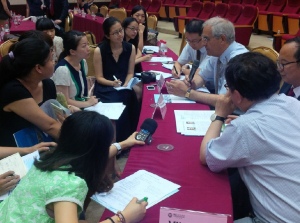Imperial and Zhejiang University launch data science collaboration

Zhejiang University in Hangzhou, China.
Some of the UK and China's leading data scientists will team up at a new London lab thanks to a partnership between Imperial and Zhejiang University.
The announcement of the Imperial - Zhejiang University (ZJU) Joint Lab for Applied Data Science was made at a major ZJU-Imperial conference ‘Big Data: Healthy Citizens, Smart Cities’, held at ZJU’s campus in Hangzhou, China, over Friday 18 and Saturday 19 July 2014.
The news comes just one month after Premier Li Keqiang visited the UK to reinforce trade, research and educational ties between the UK and China.
Data is opening new doors and spurs a revolution that will transform every aspect of lives.
– Professor Jinhua Lin
President, ZJU
At the ZJU-Imperial event, globally renowned experts in science, engineering, medicine and business – from Imperial, a world top ten university, and ZJU, one of China’s leading institutions – are meeting to exchange ideas on the future of data science and its application.
Sir Keith O’Nions, President of Imperial College London, delivered the Qi Zhen lecture on ‘Globalisation and the 21st Century University’ during the conference. He said:
“Bringing together data scientists from two of the world’s great universities will spur creativity and innovation as we use our respective strengths to push scientific discovery forwards.

Sir Keith meets Chinese journalists
“In an increasingly data rich world, collaborations like this help the academic community to convert data assets into useful knowledge and valuable products. Data scientists are making profound contributions to the development of new medicines, solutions to environmental challenges, and helping create better ways to live in smart cities. We look forward to working with ZJU to accelerate this process.”
Professor Jinhua Lin, President of Zhejiang University, said:
“The ZJU Imperial Joint Lab for Applied Data Science is a highlight of collaborative progress between the two institutions since the establishment of our partnership in May 2013.
“Data is opening new doors and spurs a revolution that will transform every aspect of lives. In a world where data is everywhere with increasing volume, velocity and variety, collaboration enables us to leverage each other’s strength to make insightful discoveries. I believe the conference is a great opportunity to share expertise, but in a more important sense, to spark new ideas of using Big Data for the well-being of human society.”
Data as a common language

Professor Yike Guo
Professor Yike Guo, Director of the Data Science Institute at Imperial, where the joint ZJU lab will be based, said:
“Data is being produced at a relentless velocity and volume. Understanding and using this data could revolutionise scientific discovery.
“The Applied Data Science Lab will allow researchers from Imperial and ZJU to better access useful data to solve major scientific problems.
“Data is fast becoming a common language, unifying key actors – from different disciplines, sectors and countries – throughout science and innovation.
“This latest addition to Imperial’s Data Science Institute will help make big data an ever more integral part of the scientific process.”
Kit Malthouse, Chair of London & Partners, the city’s business and promotional organisation, said:
“It took scientists 10 years to process the human genome for the first time – now it can be done in a day. That shows how far we have come in our ability to manage large and complex sets of data, and how powerful the results can be.
"Collaboration is the bedrock of innovation, so it’s great to see one of London’s world-leading scientific institutions joining up with colleagues in China to address the challenges and opportunities of big data. I’ve no doubt that this work will lay the foundations for future breakthroughs that will advance knowledge and improve health worldwide.”
Conference highlights
Highlights of the ZJU-Imperial big data conference include:
- Sir Keith O’Nions, President of Imperial College London, delivering the Qi Zhen lecture 2014 on ‘Globalisation and the 21st Century University’
- Professor David Gann, Imperial’s Vice President (Development & Innovation), on ‘London 2020: opportunities for data-driven innovation’
- Professor Yike Guo, Director of Imperial’s Data Science Institute, on ‘Big Data for Better Science’
- Professor Jianhui Zhong, a ZJU biomedical engineer who will speak on Big Medical Data and Medical Imaging
- Professor Hong Mi, a ZJU expert on public management, who will speak on demographic changes and the use of big data for public policy simulation
- Professor Junling Jia, a ZJU life scientist, who will speak on Biological Big Data
- Professor Paul Matthews, an Imperial neuroscientist, who will argue that ‘Grand Challenges Mean Great Opportunities: Emerging Science to Transform Future Healthcare’
- Professor Christopher Pain, an Imperial engineer, who will present on ‘Detailed Modelling of Air Pollution in Cities’
- Professor Peng Zhang, a ZJU statistician on ‘Inference on Area under the Curve Based on Methods of Quantiles’
- Professor Daniel Rueckert, Imperial’s Professor of Visual Information Processing, on ‘Big Data in Medical Imaging - Learning clinically useful information’
- Dr Aldo Faisal, Imperial’s Lecturer in Neurotechnology, on ‘Breaking into your Brain – by analysing the perception-action loop’
- Professor Xiaofei He, ZJU’s Professor of Computer Science, on ‘Learning with Parallel Vector Field’
- Professor Zhengyue Zhang, ZJU’s Professor of Mathematics, on ‘Big Data: Nonlinear Dimensionality Reduction and Sparse Recovery’
- Professor Xi Li, ZJU’s Professor of Computer Science, on ‘Big Visual Data Analysis for City Public Security’
- Professor Yibing Wang, ZJU’s Professor of Control Engineering, Professor Yueping Xu, Professor of Water Resources and Professor Qiuxiao Chen, Professor of Urban Planning, on ‘Big Data in Civil Engineering and Architecture’
- Professor Eric Yeatman, Imperial’s Professor of Microengineering, on ‘Pervasive Sensing for Smart Cities and environments’
- Dr Chao Wu, an Imperial Research Associate, on ‘Cognitive Sensing: from human intelligence to sensor intelligence’
Article text (excluding photos or graphics) © Imperial College London.
Photos and graphics subject to third party copyright used with permission or © Imperial College London.
Reporter
Andrew Scheuber
Communications Division